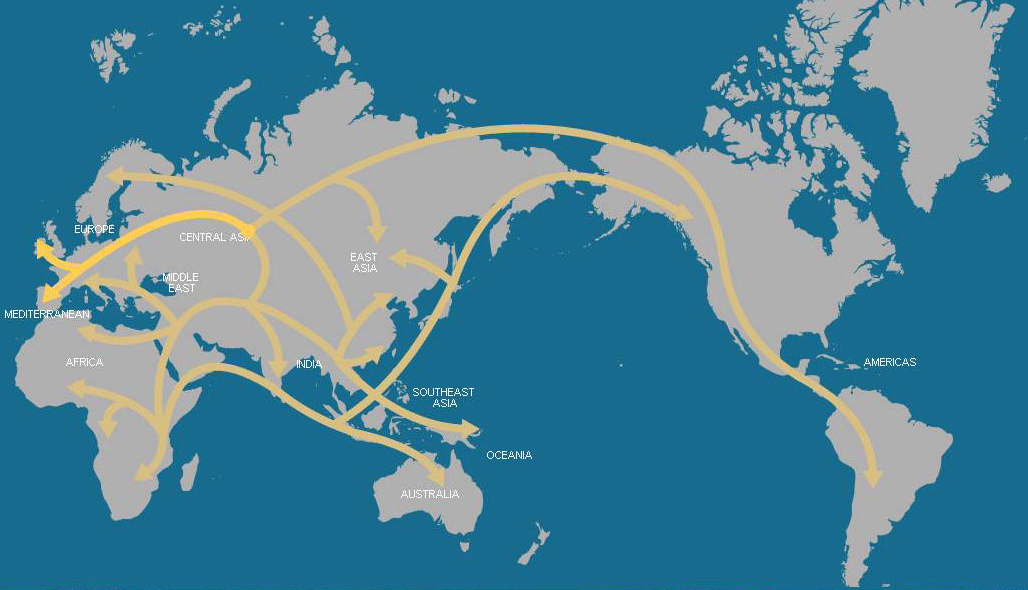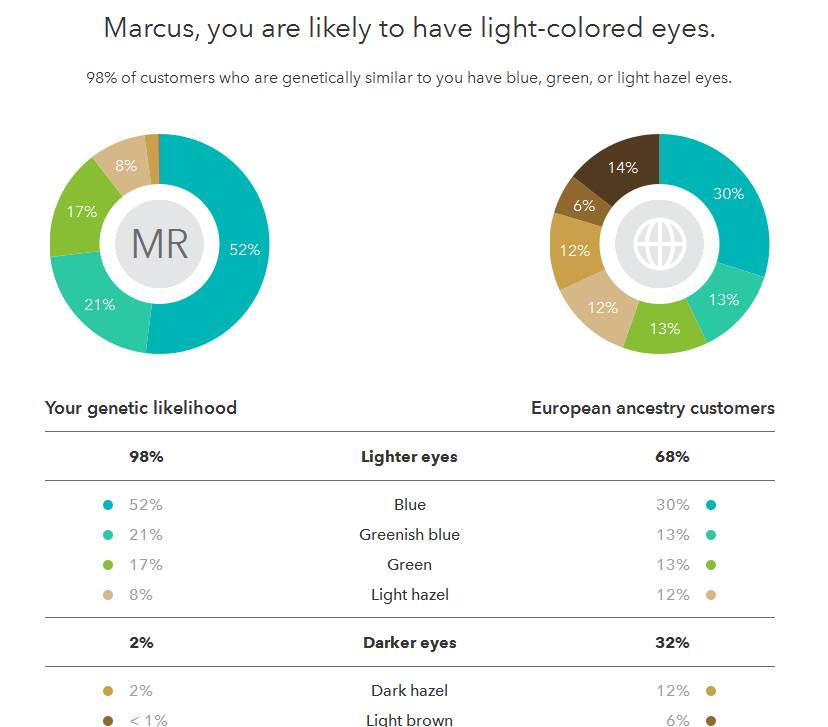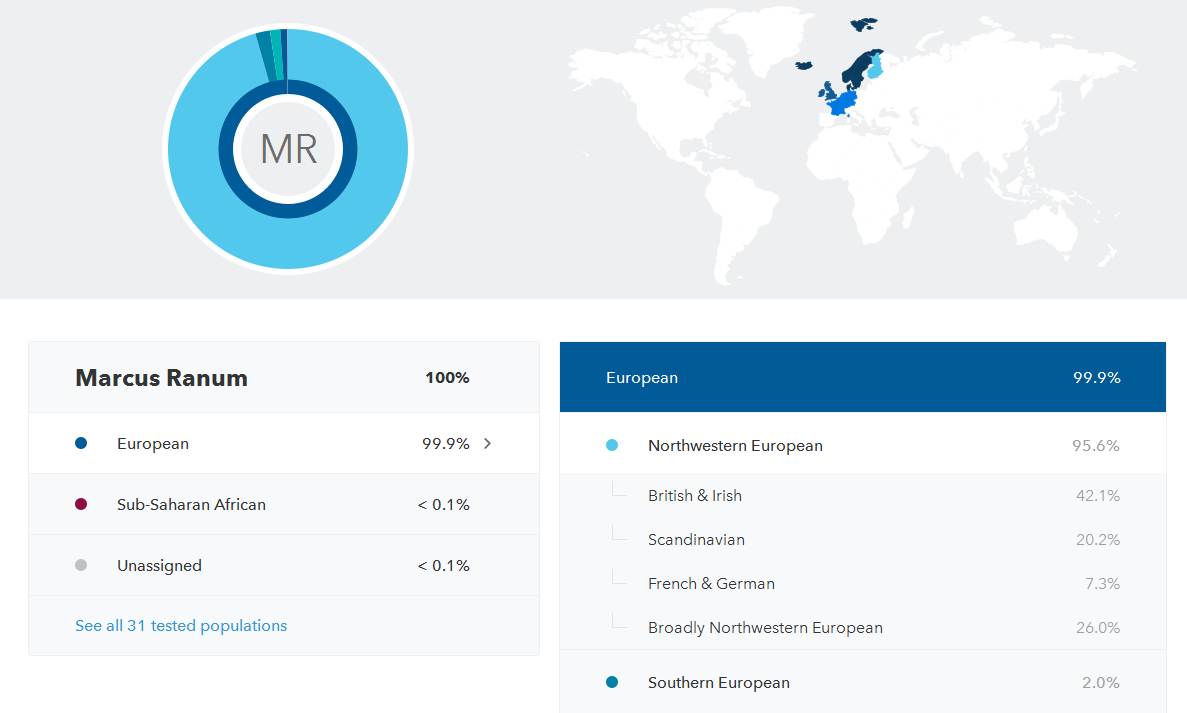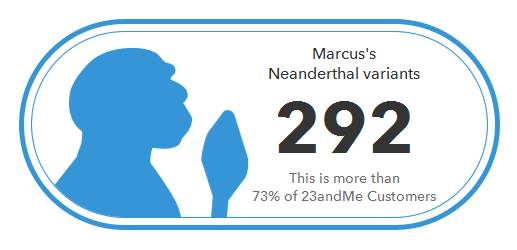Back when the National Geographic “Genographic” program kicked off, I did it (2005) and it was – interesting. It confirmed, for me, stuff I already thought I knew, which was pretty good. I have long since lost the access code for my sample so I can’t check their database any more.*
Last year I did the “23 and Me” version, which appears to be trying to do more interesting things with the data. They’re supposedly looking for genetic linkages with all kinds of behaviors and outcomes. Anyhow, after my posting on “pure blood” I thought I’d dump some of my personal medical records to the internet, in the form of my National Genographic data.

Source: National Geographic, photoshop
My mom’s haplogroup is H2A2 (through central Asia) and my dad’s is I1, the one that goes through the Middle East and up through northern Europe to Norway. Not surprisingly, my mom’s the one with the Irish ancestors and my dad’s the one with the Norwegians.
From the 23andme dataset I learn that I can detect the smell of asparagus; I already knew that. And it was right that I have light-colored eyes; my mirror did not lie.

It’s pretty cool. It has a bunch of stuff like hair color, texture, pattern baldness, yes I have a hairy back, etc – all of which came out right on the money. I am tempted to do a spit sample from a random complete stranger and see how accurate it is (but how would I know they’re not lying?!?)


I combined the heat-maps of mom and dad’s haplogroups using the magic of photoshop:
I imagine that some people who do these tests receive a bit of a shock. So do the folks at 23andme:

Some of you are probably wondering if 23andme does a check for your Ghenghis Khan quotient. For a while they used to they say they do, but I contacted support and now that feature is covered under “relatedness to named people”. So if I knew 20 people who were all descended from Niall of the 9 hostages, I’d show a degree of relatedness and I might be able to figure it out that way. I’m a bit suspicious: the information is hidden in their database, I am guessing they turned off the feature because too many white supremacists found out they were descended from the greatest conqueror the world has yet known (but he’s not white)…
But here’s the one I really like! The one that doubtless makes superior Euro-centric racist nazis cringe:

Hi Score!
I am special.

(* They had a card-based system, where you sent your sample in and retained a torn off “key” so you could check it later. I did it in 2005 and searched my email archives and I’m happy to say that the key never got exchanged in email, so I am effectively locked out! That’s actually good design and makes me happy – no “last 4 digits of social security #” nonsense..)

Maybe not. There was a particularly nasty racist who showed up in the comments to one of Roy Edroso’s Village Voice articles some years ago. He was peddling some nonsense about how Neanderthal genes made Europeans less violent than Africans. Nothing fazes these idiots.
Rob Grigjanis@#1:
He was peddling some nonsense about how Neanderthal genes made Europeans less violent than Africans. Nothing fazes these idiots.
That’s a textbook example of “motivated reasoning” isn’t it? I wonder what his Neanderthal level is. ;)
Your DNA really got around, you hussie
Shiv@#3:
Your DNA really got around, you hussie
I just wanna know if I’ve got any Niall or Ghenghis, damn it!!!! Who cares about a bunch of peaceful neanderthals? They’re not even our species!
Hell with Ghengis Khan, I wanna know if I have any of Ghengis Cohen’s blood. Cause if I do, that means Earth has been visited by people from Discworld, and that would make me very happy.
Johnny Vector@#5:
Can you imagine the excitement that would cause in the genomics projects, if suddenly a whole palette of new haplotypes appeared that were never seen/expressed before? I guess that’d be pretty much stone proof there were aliens living among us.
Hello all, this is an interesting blog.
It’s easy to be a white supremacist descendant of Genghis Khan. Now imagine if your family also spoke Mongolian.
In the late 19th/early 20th century it was often assumed in Western anthropology that Finns and other Uralic speaking peoples of Europe must be in large part “mongoloid”, as the racial term was then for East Asian and Siberian populations. The Uralic language group was known to to have originated in the Urals region, which was considered to be practically Siberia.
This was something to deal with for Finnish nationalists, who back then tended to be white supremacists. They were quick to point out, against the common assumptions of the era, that linguistic heritage does not necessarily much correlate with genetic heritage, and that small amount of racial mixing does not make white people fundamentally non-white.
Arctic Ape@#7:
This was something to deal with for Finnish nationalists, who back then tended to be white supremacists. They were quick to point out, against the common assumptions of the era, that linguistic heritage does not necessarily much correlate with genetic heritage, and that small amount of racial mixing does not make white people fundamentally non-white.
They probably have a lot of Neanderthal in ’em too. Darn it, white supremacists are going to make us neo-neanderthals look bad.
Back in the day I participated in a couple of boards of the Earth’s Children fandom (ie the fandom of the works of Jean Auel). We would get so many crackpots showing up with their ‘theories’ about human evolution. From the one that claimed cave paintings proved Neanderthals rode mammoths to the one that claimed people with autism have Neanderthal neurology. Arguing with them was a special kind of ‘fun’ (what level of evidence is needed to declare a proposition ridiculous?), and when there was a lot of that going on it had a chilling effect on discussion of actual science.
anat@#9:
Arguing with them was a special kind of ‘fun’ (what level of evidence is needed to declare a proposition ridiculous?)
I don’t think there’s any amount that is, other than to ask how they came by their beliefs and what supports them.